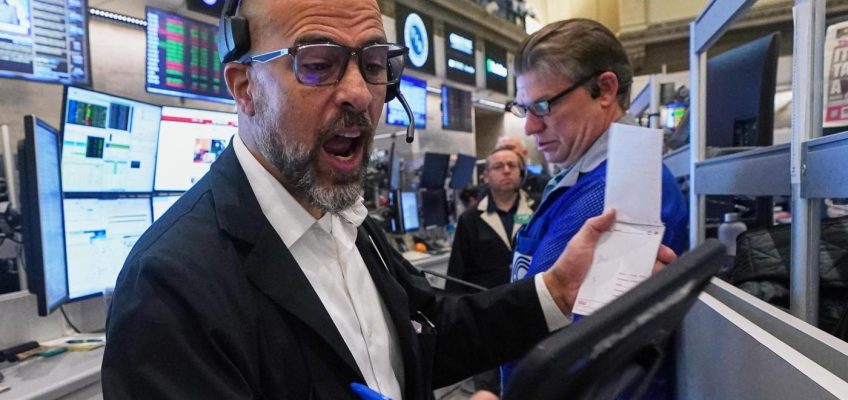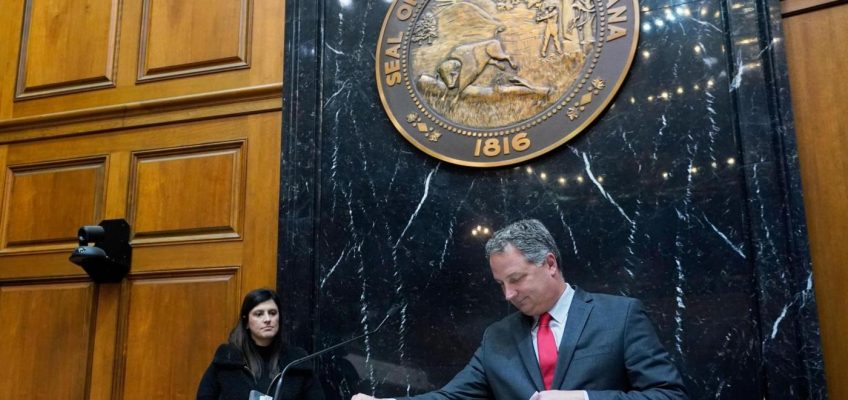By MIKE CATALINI, Associated Press
President Donald Trump’s former personal lawyer Alina Habba, whom the administration has maneuvered to keep in place as New Jersey’s top federal prosecutor, is disqualified from serving in the role, an appeal court said Monday.
A panel of judges from the 3rd U.S. Circuit Court of Appeals sitting in Philadelphia sided with a lower court judge’s ruling after hearing oral arguments at which Habba herself was present on Oct. 20.
“It is apparent that the current administration has been frustrated by some of the legal and political barriers to getting its appointees in place. Its efforts to elevate its preferred candidate for U.S. Attorney for the District of New Jersey, Alina Habba, to the role of Acting U.S. Attorney demonstrate the difficulties it has faced — yet the citizens of New Jersey and the loyal employees in the U.S. Attorney’s Office deserve some clarity and stability,” the court wrote in a 32-page opinion.
It concluded: “We will affirm the District Court’s disqualification order.”
The ruling comes amid the push by President Donald Trump’s Republican administration to keep Habba as the acting U.S. attorney for New Jersey, a powerful post charged with enforcing federal criminal and civil law. It also comes after the judges questioned the government’s moves to keep Habba in place after her interim appointment expired and without her getting Senate confirmation.
Habba said after that hearing in a statement posted to X that she was fighting on behalf of other candidates to be federal prosecutors who have been denied a chance for a Senate hearing.
Messages were left Monday seeking comment from the U.S. attorney’s office in New Jersey, Habba’s personal staffer and the Justice Department.
Habba is hardly the only Trump administration prosecutor whose appointment has been challenged by defense lawyers.
Last week, a federal judge dismissed criminal cases against former FBI Director James Comey and New York Attorney General Letitia James after concluding that the hastily installed prosecutor who filed the charges, Lindsey Halligan, was unlawfully appointed to the position of interim U.S. attorney for the Eastern District of Virginia. The Justice Department has said it intends to appeal the rulings.
The judges on the panel were two appointed by Republican President George W. Bush, D. Brooks Smith and D. Michael Fisher, as well as one named by Democratic President Barack Obama, Luis Felipe Restrepo.
A lower court judge said in August Habba’s appointment was done with a “novel series of legal and personnel moves” and that she was not lawfully serving as U.S attorney for New Jersey.
That order said her actions since July could be invalidated, but he stayed the order pending appeal.
The government argued Habba is validly serving in the role under a federal statute allowing the first assistant attorney, a post she was appointed to by the Trump administration.
A similar dynamic is playing out in Nevada, where a federal judge disqualified the Trump administration’s pick to be U.S. attorney there.
The Habba case comes after several people charged with federal crimes in New Jersey challenged the legality of Habba’s tenure. They sought to block the charges, arguing she didn’t have the authority to prosecute their cases after her 120-day term as interim U.S. attorney expired.
Habba was Trump’s attorney in criminal and civil proceedings before he was elected to a second term. She served as a White House adviser briefly before Trump named her as a federal prosecutor in March.
Shortly after her appointment, she said in an interview with a right-wing influence that she hoped to help “turn New Jersey red,” a rare overt political expression from a prosecutor.
She then brought a trespassing charge, eventually dropped, against Democratic Newark Mayor Ras Baraka stemming from his visit to a federal immigration detention center.
Habba later charged Democratic U.S. Rep. LaMonica McIver with assault stemming from the same incident, a rare federal criminal case against a sitting member of Congress other than for corruption. McIver denied the charges and pleaded not guilty. The case is pending.
Questions about whether Habba would continue in the job arose in July when her temporary appointment was ending and it became clear New Jersey’s two Democratic U.S. senators, Cory Booker and Andy Kim, would not back her appointment.
Earlier this year as her appointment was expiring, federal judges in New Jersey exercised their power under the law to replace Habba with a career prosecutor who had served as her second-in-command.
Bondi then fired the prosecutor installed by the judges and renamed Habba as acting U.S. attorney. The Justice Department said the judges acted prematurely and said Trump had the authority to appoint his preferred candidate to enforce federal laws in the state.
Brann’s ruling said the president’s appointments are still subject to the time limits and power-sharing rules laid out in federal law.
Indiana lawmakers in state House to convene session with redistricting top of mind
Melania Trump reveals White House holiday decorations and her theme, ‘Home Is Where the Heart Is’
Trump says he’ll release MRI results but doesn’t know what part of his body was scanned
Land and security are the main sticking points as Russia and Ukraine mull Trump’s peace proposal
In announcing pardon of drug trafficker while threatening Venezuela, Trump displays contradictions




